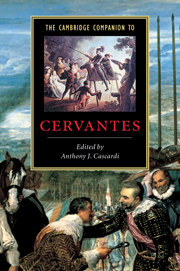Book contents
- Frontmatter
- 1 Introduction
- 2 The historical and social context
- 3 Cervantes and the Italian Renaissance
- 4 Don Quixote and the invention of the novel
- 5 The influence of Cervantes
- 6 Cervantes’ other fiction
- 7 Writings for the stage
- 8 Humor and violence in Cervantes
- 9 Psyche and gender in Cervantes
- 10 Cervantes and the New World
- Appendix: electronic editions and scholarly resources
- Index
- Series List
2 - The historical and social context
Published online by Cambridge University Press: 28 May 2006
- Frontmatter
- 1 Introduction
- 2 The historical and social context
- 3 Cervantes and the Italian Renaissance
- 4 Don Quixote and the invention of the novel
- 5 The influence of Cervantes
- 6 Cervantes’ other fiction
- 7 Writings for the stage
- 8 Humor and violence in Cervantes
- 9 Psyche and gender in Cervantes
- 10 Cervantes and the New World
- Appendix: electronic editions and scholarly resources
- Index
- Series List
Summary
At a critical point in his short story “La española inglesa” (“The English Spanish Lady”) Cervantes has to repatriate the heroine Isabela from London to Seville. Writers of romance conventionally handled journeys of this kind by supernatural means or by an authorial stroke of the pen. But Isabela would be taking with her a dowry of 10,000 escudos, and England and Spain were at war: how was she going to get home with the fortune intact? Interested readers can consult the text to see exactly how it was done, but the solution is a masterpiece of early modern capitalism involving a network of French merchant bankers acting on commission: one in London to take care of the cash and arrange the transfer; another to issue the documents in Paris to throw the authorities off the scent; and another to cash the cheque once Isabela arrives back in Seville.
This mixture of high romance and precise documentary detail is a trademark of Cervantes, and one of the reasons why it is important to try to understand, four centuries later, the relationship between his work and the world in which he lived. Reputation has transformed the historical Cervantes into a universal genius, independent of time or place; yet the very work which made his name, Don Quixote, is not only profoundly steeped in the social and economic reality of Habsburg Spain, but has anachronism as its central theme.
- Type
- Chapter
- Information
- The Cambridge Companion to Cervantes , pp. 11 - 31Publisher: Cambridge University PressPrint publication year: 2002
- 3
- Cited by

